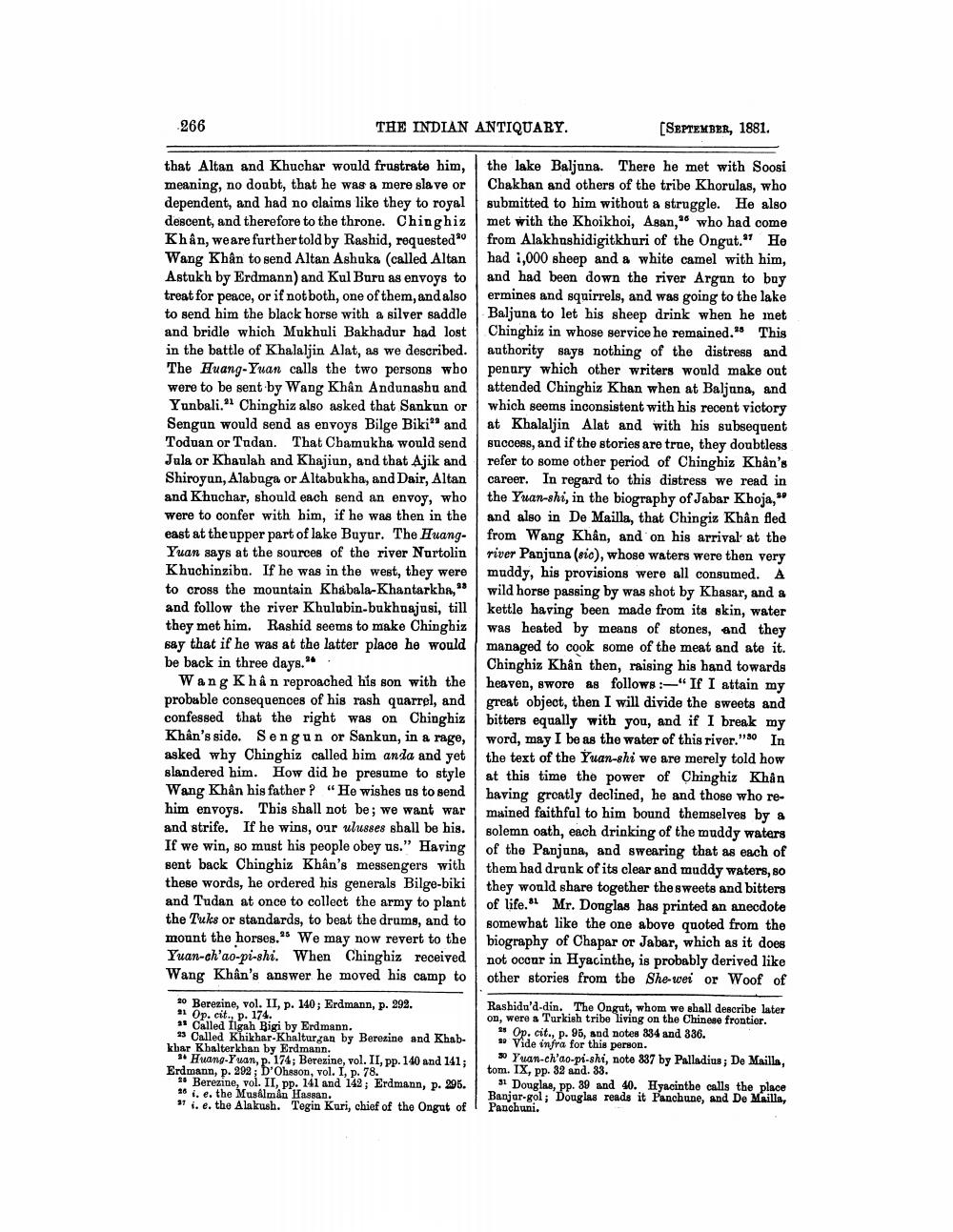________________
266
THE INDIAN ANTIQUARY.
that Altan and Khuchar would frustrate him, meaning, no doubt, that he was a mere slave or dependent, and had no claims like they to royal descent, and therefore to the throne. Chinghiz Khân, weare further told by Rashid, requested 20 Wang Khân to send Altan Ashuka (called Altan Astukh by Erdmann) and Kul Buru as envoys to treat for peace, or if not both, one of them, and also to send him the black horse with a silver saddle and bridle which Mukhuli Bakhadur had lost in the battle of Khalaljin Alat, as we described. The Huang-Yuan calls the two persons who were to be sent by Wang Khân Andunashu and Yunbali." Chinghiz also asked that Sankun or Sengun would send as envoys Bilge Biki" and Toduan or Tudan. That Chamukha would send Jula or Khaulah and Khajiun, and that Ajik and Shiroyun, Alabuga or Altabukha, and Dair, Altan and Khuchar, should each send an envoy, who were to confer with him, if he was then in the east at the upper part of lake Buyur. The HuangYuan says at the sources of the river Nurtolin Khuchinzibu. If he was in the west, they were to cross the mountain Khabala-Khantarkha," and follow the river Khulubin-bukhuajusi, till they met him. Rashid seems to make Chinghiz say that if he was at the latter place he would be back in three days."
Wang Khân reproached his son with the probable consequences of his rash quarrel, and confessed that the right was on Chinghiz Khân's side. Sengun or Sankun, in a rage, asked why Chinghiz called him anda and yet slandered him. How did he presume to style Wang Khân his father? "He wishes us to send him envoys. This shall not be; we want war and strife. If he wins, our ulusses shall be his. If we win, so must his people obey us." Having sent back Chinghiz Khân's messengers with these words, he ordered his generals Bilge-biki and Tudan at once to collect the army to plant the Tuks or standards, to beat the drums, and to mount the horses.25 We may now revert to the Yuan-ch'ao-pi-shi. When Chinghiz received Wang Khân's answer he moved his camp to
20 Berezine, vol. II, p. 140; Erdmann, p. 292. 21 Op. cit., p. 174.
2 Called Ilgah Bigi by Erdmann.
23 Called Khikhar-Khalturgan by Berezine and Khabkhar Khalterkhan by Erdmann.
[SEPTEMBER, 1881.
the lake Baljuna. There he met with Soosi Chakhan and others of the tribe Khorulas, who submitted to him without a struggle. He also met with the Khoikhoi, Asan, who had come from Alakhushidigitkhuri of the Ongut." He had 1,000 sheep and a white camel with him, and had been down the river Argun to buy ermines and squirrels, and was going to the lake Baljuna to let his sheep drink when he met Chinghiz in whose service he remained. This authority says nothing of the distress and penury which other writers would make out attended Chinghiz Khan when at Baljuna, and which seems inconsistent with his recent victory at Khalaljin Alat and with his subsequent success, and if the stories are true, they doubtless refer to some other period of Chinghiz Khan's career. In regard to this distress we read in the Yuan-shi, in the biography of Jabar Khoja," and also in De Mailla, that Chingiz Khân fled from Wang Khân, and on his arrival at the river Panjuna (sic), whose waters were then very muddy, his provisions were all consumed. A wild horse passing by was shot by Khasar, and a kettle having been made from its skin, water was heated by means of stones, and they managed to cook some of the meat and ate it. Chinghiz Khân then, raising his hand towards heaven, swore as follows: If I attain my great object, then I will divide the sweets and bitters equally with you, and if I break my word, may I be as the water of this river."50 In the text of the Yuan-shi we are merely told how at this time the power of Chinghiz Khân having greatly declined, he and those who remained faithful to him bound themselves by a solemn oath, each drinking of the muddy waters of the Panjuna, and swearing that as each of them had drunk of its clear and muddy waters, so they would share together the sweets and bitters of life. Mr. Douglas has printed an anecdote somewhat like the one above quoted from the biography of Chapar or Jabar, which as it does not occur in Hyacinthe, is probably derived like other stories from the She-wei or Woof of Rashidu'd-din. The Ongut, whom we shall describe later on, were a Turkish tribe living on the Chinese frontier. 2 Op. cit., p. 95, and notes 334 and 336.
Vide infra for this person.
Huang-Yuan, p. 174; Berezine, vol. II, pp. 140 and 141; Erdmann, p. 292; D'Ohsson, vol. I, p. 78.
2 Berezine, vol. II, pp. 141 and 142; Erdmann, p. 295. 26 i. e. the Musalman Hassan.
37. e. the Alakush. Tegin Kuri, chief of the Ongut of
so Yuan-ch'ao-pi-shi, note 337 by Palladius; De Mailla, tom. IX, pp. 32 and. 33.
31 Douglas, pp. 39 and 40. Hyacinthe calls the place Banjar-gol; Douglas reads it Panchune, and De Mailla,
Panchuni.




